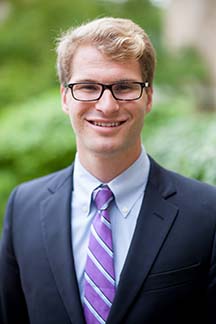 Jack Kenney
Jack Kenney
At the College of the Holy Cross, a 2,900-student Jesuit institution in Worcester, Mass., Jack Kenney earned degrees in both chemistry and economics while playing hockey and serving as a social leader. He was ready for the demands of the first semester at ESTEEM.
“I think that experience of being able to contribute to campus life in a big way athletically, academically, and socially prepared me for ESTEEM,” Kenney says. “It had this distinct sense of community that Notre Dame has too. Being able to contribute to that community prepared me to do so on a larger stage. I think one of the key benefits of the ESTEEM program is the fact that they throw a lot at you. They throw a lot at everybody. It’s a good opportunity to learn how to deal with a lot on our plate.”
Marisa Cameron, who earned a mathematics degree at Holy Cross where she played varsity golf, intended to go to Columbia University for a bachelor’s in engineering but chose ESTEEM to advance her business knowledge.
 Marisa Cameron
Marisa Cameron
“I obviously had a lot of math, coupled with very basic introductory science classes. I realized that I really did enjoy the business side of things,” she says. “I had many internships in finance as well as an academic internship at school that involved portfolio analysis. I wanted to tie my technical with the more business side of things when I graduate. ESTEEM was a great place to start.
“Being interested in math and business, I feel that I’ve definitely utilized a lot of those skills I learned, whether it be analytical or time management skills, to further my preparation here at ESTEEM or understand things in a different way. A lot of kids here were not math majors, so it’s nice to help them. Because I didn’t have a sole focus in business, I feel ESTEEM is giving me an ability to be an entrepreneur or intrapreneur,” applying the mindset in a startup or larger established company. We took one class in the summer called Business Model Canvass, which was really insightful to show all the facets when thinking about starting a business. The thesis is also a great opportunity. It’s already given me a lot of knowledge on how to commercialize this device I was given to validate.”
Cameron is working with a computer science professor and Ph.D. student who are developing a wearable device for addressing social anxiety in autistic children. The device captures speech during social interactions as a way to address the child’s emotions and provide interventions.
Kenney’s capstone thesis involves the biopharmaceutical company Amicus Therapeutics in New Jersey, led by a Notre Dame graduate whose fight against his own children’s rare disease was the basis of the movie “Extraordinary Measures.”
“It’s definitely cool to have exposure to that as a grad student,” he says. “My academic experience of ESTEEM has been great, too. The summer program is pretty intense, which is awesome. It was nice to be able to be here with everyone and kind of work through the challenge of the ESTEEM program in the summer together. You do that in the form of group projects, which I really enjoy. I think it’s good for providing a baseline – this is the amount of work I need to put in to do some great things in the professional world after I leave ESTEEM. The summer shows you what a strong work ethic and a strong workload looks like.”
Both students expect their ESTEEM experience to impact their careers long beyond graduation.
“The ESTEEM program has provided a great opportunity to put a professional spin on what I studied in undergrad and bridge the gap, taking things form the classroom at Holy Cross to the professional world,” Kenney says.
“I’ve already seen the great network that Notre Dame offers, and I’ve met some amazing, interesting people who once they leave here are definitely not going to forget about you,” Cameron says. “They want to help you succeed.”